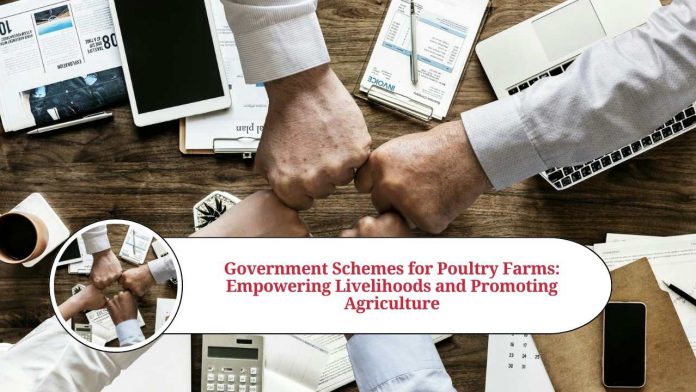The government has introduced various schemes to promote and support poultry farming as a viable livelihood option. These schemes aim to empower farmers, particularly those engaged in poultry farming, by providing financial assistance, training, infrastructure development, and market linkages. By implementing these schemes, the government seeks to enhance agricultural productivity, generate employment opportunities, and improve the overall income and livelihoods of individuals involved in poultry farming.
Financial Assistance for Poultry Farming
Under this category, the government provides financial support to individuals interested in setting up or expanding their poultry farms. Schemes such as the Poultry Entrepreneurship Development Scheme (PEDS) offer loans, subsidies, and grants for activities such as procuring poultry equipment, constructing farm infrastructure, and purchasing livestock. This financial assistance aims to alleviate the initial investment burden and promote the growth of poultry farming enterprises.
Training and Skill Development Programs
To enhance the knowledge and skills of poultry farmers, the government conducts training and skill development programs. These programs cover various aspects of poultry farming, including breed selection, poultry management practices, disease control, feed management, and marketing strategies. By providing technical expertise and practical training, the government equips farmers with the necessary skills to optimize productivity and ensure the sustainability of their poultry farms.
Infrastructure Development and Technology
Adoption To strengthen the poultry farming sector, the government focuses on infrastructure development and technology adoption. Schemes under this category support the establishment of hatcheries, cold storage facilities, processing units, and marketing infrastructure. Additionally, the government promotes the adoption of modern technologies and best practices such as automated feeding systems, biosecurity measures, and efficient waste management techniques to enhance productivity and profitability.
Market Linkages and Promotion
Government schemes also emphasize market linkages and the promotion of poultry products. The government facilitates market access for poultry farmers by establishing marketing networks, organizing poultry exhibitions and fairs, and connecting farmers with potential buyers, processors, and retail outlets. Additionally, the government undertakes promotional campaigns to create awareness about the quality and nutritional value of poultry products, thereby stimulating demand and ensuring fair returns for farmers.
Read more useful content:
FAQs:
Q1: Who is eligible to avail of the government schemes for poultry farming?
A1: Eligibility criteria for government schemes may vary based on the specific guidelines set by the government. Generally, individuals involved in poultry farming, including small-scale farmers, entrepreneurs, and cooperative societies, are eligible to avail of these schemes. It is advisable to check the specific eligibility criteria and required documents outlined by the government or the implementing agency.
Q2: How can individuals apply for financial assistance under the government poultry farm schemes?
A2: Individuals can typically apply for financial assistance by submitting the necessary documents and application forms to the designated government authorities or implementing agencies. The required documents may include proof of identity, address, ownership of land or premises, project proposals, and financial statements. It is recommended to follow the instructions and guidelines provided by the government or the implementing agency for a smooth application process.
Q3: Are there any training programs available for poultry farmers?
A3: Yes, the government conducts training programs and skill development initiatives for poultry farmers. These programs cover various aspects of poultry farming, including breed selection, farm management, disease control, and marketing strategies. Interested farmers can inquire about these programs at government agricultural offices, veterinary centers, or poultry development institutes.
Q4: What kind of infrastructure support is available under the government poultry farm schemes?
A4: The government provides infrastructure support for poultry farms, including the establishment of hatcheries, cold storage facilities, processing units, and marketing infrastructure. The specific support available may vary depending on the scheme and the farmer’s requirements. It is advisable to consult with the implementing agency or the concerned government department for detailed information on infrastructure development support.
Q5: How does the government help in marketing poultry products?
A5: The government facilitates market linkages for poultry farmers by establishing marketing networks, organizing poultry exhibitions and fairs, and connecting farmers with potential buyers, processors, and retail outlets. Additionally, the government undertakes promotional campaigns to create awareness about the quality and nutritional value of poultry products, thereby boosting market demand and ensuring better prices for farmers.
Q6: Is there any post-implementation support available under the government schemes?
A6: Yes, some government schemes provide post-implementation support to poultry farmers in the form of monitoring, technical assistance, and troubleshooting guidance. These support mechanisms aim to ensure the smooth functioning and sustainability of poultry farms. It is advisable to inquire with the implementing agency or the concerned government department regarding the post-implementation support available under specific schemes.




















